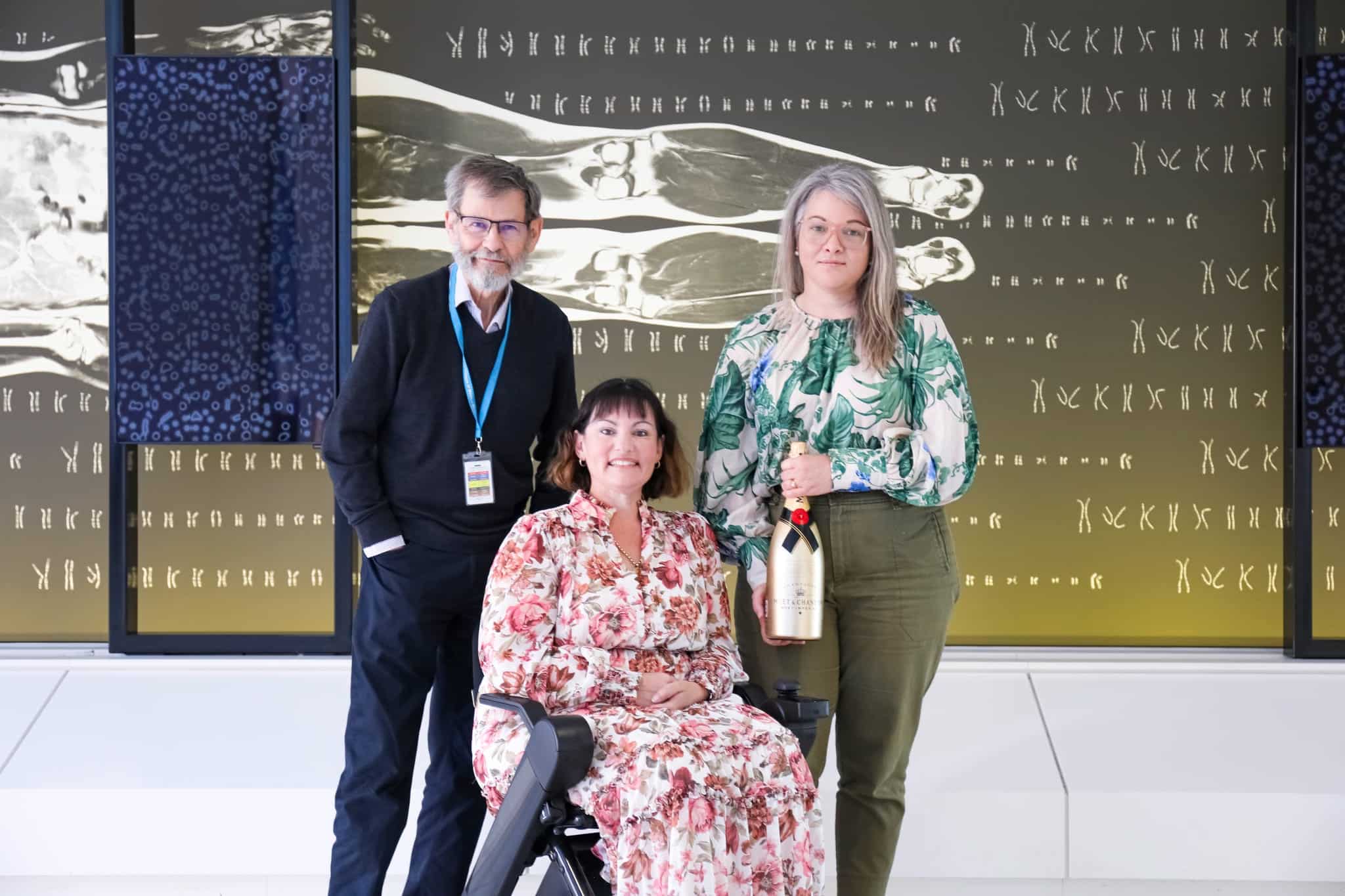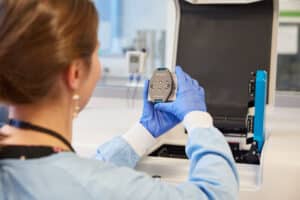
Researchers at Perth’s Harry Perkins Institute of Medical Research and PathWest Laboratory Medicine WA are celebrating the long-awaited nationally recognised accreditation of a world-leading diagnostic technology that will provide faster, more accurate genomic tests for patients with genetic neuromuscular conditions.
NATA, Australia’s leading national accreditation body for laboratories, gave the Bionano Sapphyr instrument installed at PathWest the official tick of approval this month. The Bionano was installed at the Diagnostic Genomics lab at PathWest in August 2022 and is the only machine in a diagnostic service in Australia. The Bionano Sapphyr instrument was generously funded by philanthropy through the FSHD Global Research Foundation in Sydney.

Dr Harmony Clayton, Medical Scientist at Diagnostic Genomics lab at PathWest, using the Bionano Sapphyr.
Since the Bionano was installed, researchers from the Perkins Rare Disease Genetics and Functional Genomics laboratory have worked with PathWest running tests on patient blood samples to accurately diagnose facioscapulohumeral muscular dystrophy (FSHD).
Managing Director of FSHD Global Research Foundation, Emma Weatherley said that it was a remarkable milestone that Australians now have access to world class genetic disease diagnostics.
“This gold-standard technology will lessen the burden for people trying to find the cause of their disease, and it will enable research, facilitate trials of new treatments, and help us find cures.
“Our patient population can now be genetically diagnosed which means we can bring clinical trials to Australia and offer them to people who have received accurate diagnoses. This new technology can detect genetic defects previously unable to be identified,” Ms Weatherley said.
FSHD is a highly complex disease that causes progressive muscle wasting, weakening and loss of skeletal muscle in adults and children, robbing them of the ability to walk, talk, smile, blink or even eat. It is the second most common neuromuscular disease in Australia.
Head of the Rare Disease Genetics Group at Perth’s Harry Perkins Institute of Medical Research, Associate Professor Gina Ravenscroft, said the Bionano will significantly advance Australia’s contribution to global research of FSHD but also other rare genetic diseases.
“It will increase the number of diseases that can be diagnosed and enable cutting-edge genomic research,” A/Prof Ravenscroft said.
“There are many debilitating genetic diseases. Some like FSHD greatly affect people’s daily lives. Getting an accurate genetic diagnosis has important implications for patients and their families.
“They can know what’s ahead for them, know if they have a disease that will worsen over time, and make plans and choices.
“The opportunities the Bionano can provide will be life changing. In the past patients struggled to access an accurate test for FSHD and other forms of neuromuscular and neurodegenerative diseases”, she said.
Most diagnoses of genetic mutations use DNA sequencing but many neurodegenerative diseases, have very large mutations on the DNA that are too long to detect using traditional sequencing techniques.
“Instead of using DNA sequencing the Bionano uses a fluorescent marker to optically map ultra-long DNA fragments. This approach allows for the detection of types of genetic defects that can’t be easily picked up with normal DNA sequencing”, A/Prof Ravenscroft said.
“Knowing who has a genetic disease means that for organisations like the FSHD Global Research Foundation they can offer support and play a key role in helping the Australian community become ready for clinical trials of potential treatments as they become available.”
Australian and NZ patients who are suspected to have FSHD can access this genetic diagnostic test in consultation with their medical specialist.
IMAGE: L-R: Emeritus Professor Nigel Laing AO, Emma Weatherley, Associate Professor Gina Ravenscroft. Credit: Harry Perkins Institute.
